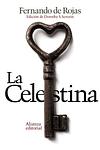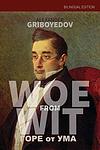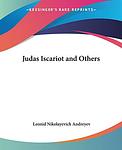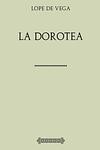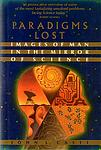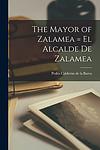The Greatest Russian, Spanish "Plays" Books of All Time
Click to learn how this list is calculated.
This list represents a comprehensive and trusted collection of the greatest books. Developed through a specialized algorithm, it brings together 305 'best of' book lists to form a definitive guide to the world's most acclaimed books. For those interested in how these books are chosen, additional details can be found on the rankings page.
Genres
Plays are a category of literature that consists of written works intended for performance on stage. They typically feature dialogue between characters and are structured into acts and scenes. Plays can be comedic, tragic, or a combination of both, and often explore themes such as love, power, and morality. They are meant to be performed by actors in front of an audience, and can be enjoyed both as written works and as live performances.
Countries
Date Range
Reading Statistics
Click the button below to see how many of these books you've read!
Download
If you're interested in downloading this list as a CSV file for use in a spreadsheet application, you can easily do so by clicking the button below. Please note that to ensure a manageable file size and faster download, the CSV will include details for only the first 500 books.
Download-
1. The Cherry Orchard by Anton Chekhov
"The Cherry Orchard" is a classic play about an aristocratic Russian woman and her family as they return to their family estate, which includes a large and well-known cherry orchard. The family is on the brink of financial ruin and the estate is slated to be auctioned off. Despite various attempts to save their beloved home and orchard, they are ultimately unable to prevent the sale. The play is a poignant reflection on the changing social order and the decline of the aristocracy in Russia at the turn of the 20th century.
The 455th Greatest Book of All Time -
2. La Celestina by Fernando de Rojas
The book is a tragic comedy set in 15th-century Spain, revolving around the passionate and ill-fated love affair between Calisto and Melibea. After Calisto falls for Melibea but is rejected, he enlists the help of Celestina, an old and cunning procuress, to win Melibea's heart. Celestina's manipulations initially seem successful, but her greed and the involvement of various other servants and hangers-on lead to a series of dramatic and violent events. The story ultimately unfolds into a cautionary tale of lust, deception, and the destructive consequences of obsessive love, ending in tragedy for most of the main characters.
The 649th Greatest Book of All Time -
3. Three Sisters by Anton Chekhov
"Three Sisters" is a play that revolves around the lives of three sisters, Olga, Masha, and Irina, who live in a provincial Russian town and yearn for their former life in Moscow. The story explores their relationships, dreams, and disappointments, as well as their interactions with the military officers stationed nearby. The narrative is a poignant exploration of love, loss, and the relentless passage of time, highlighting the human struggle for meaning and happiness.
The 655th Greatest Book of All Time -
4. Life Is a Dream by Pedro Calderón de la Barca
"Life is a Dream" is a philosophical allegory regarding the human situation and the mystery of life. The play follows the story of Segismundo, Prince of Poland, who has been imprisoned in a tower by his father, King Basilio, following a dire prophecy that the prince would bring disaster to the country and death to the King. Basilio briefly frees Segismundo but returns him to the tower when the prince proves violent and unruly. The story explores themes of free will, fate, power and the thin line that separates reality from dreams.
The 1186th Greatest Book of All Time -
5. The Seagull by Anton Chekhov
The play revolves around the complex interplay of love, art, and the pursuit of happiness among a group of characters gathered at a Russian country estate. Central to the narrative is a young aspiring playwright, who yearns for the recognition of his art and the love of a woman, an actress infatuated with a successful writer. The story unfolds as these characters grapple with unrequited affections, artistic ambitions, and the crushing weight of societal expectations, leading to a tapestry of human desires, disillusionment, and the search for meaning in life.
The 1606th Greatest Book of All Time -
6. The Government Inspector by Nikolai Gogol
The play is a satirical comedy that exposes the corruption and foolishness of the bureaucracy in a small Russian town. When officials mistake a lowly civil servant for a feared government inspector traveling incognito, they fall over themselves to cover up their town's numerous misdeeds. The visitor exploits the situation for personal gain, accepting bribes and enjoying the sycophantic hospitality of the town's officials, who are oblivious to his true identity. The story unfolds with a series of comedic misunderstandings and ironic twists, culminating in a final revelation that leaves the townspeople facing the consequences of their deception and moral laxity.
The 1704th Greatest Book of All Time -
7. Uncle Vanya by Anton Chekhov
"Uncle Vanya" is a play that explores the themes of existential boredom and human folly through the story of an elderly professor and his young wife visiting their rural estate run by the professor's brother-in-law, Vanya, and daughter, Sonya. The visit disrupts the monotonous life of the estate, leading to emotional chaos, unrequited love, and a failed murder attempt. The play ends with the departure of the professor and his wife, leaving Vanya and Sonya to return to their life of drudgery, finding solace in the hope of a better life in the afterlife.
The 1923rd Greatest Book of All Time -
8. Boris Godunov by Alexander Pushkin
The narrative centers on the tumultuous political landscape of Russia following the death of Tsar Ivan the Terrible. It delves into the ascent of Boris Godunov to the Russian throne amidst power struggles, rumors, and the specter of a pretender claiming to be the rightful heir. The story explores themes of ambition, guilt, and the heavy burden of leadership as Boris grapples with his conscience and the consequences of his actions in a period marked by political intrigue, betrayal, and the quest for legitimacy in a nation on the brink of turmoil.
The 2380th Greatest Book of All Time -
9. Bohemian Lights by Ramón del Valle-Inclán
"Bohemian Lights" is a novel set in early 20th century Madrid, Spain, featuring a group of bohemian artists and intellectuals as they navigate poverty, passion, and the pursuit of their crafts. The narrative captures their struggles and triumphs, the vibrant and decadent world they inhabit, and their unyielding commitment to their artistic ideals. The novel offers a vivid portrayal of bohemian life, with its blend of joy, despair, and relentless creative energy.
The 2605th Greatest Book of All Time -
10. The Trickster of Seville and His Guest of Stone by Tirso de Molina
"The Trickster of Seville and His Guest of Stone" is a classic Spanish play that tells the story of a libertine nobleman who seduces women and leaves them, refusing to marry. His actions lead to severe consequences when he invites a statue of a man he has wronged to dinner. The statue, representing divine justice, accepts the invitation and later reciprocates, leading to the protagonist's downfall. The play is widely recognized for introducing the legendary character of the seductive rogue to the world of literature.
The 2935th Greatest Book of All Time -
11. The Lower Depths by Maxim Gorky
The book is a stark depiction of the lives of the impoverished and dispossessed at the bottom of the Russian social ladder in the early 20th century. Set in a squalid shelter, it presents a group of destitute individuals from various backgrounds—thieves, prostitutes, and the down-and-out—who share their stories and philosophies as they grapple with the harsh realities of poverty and survival. The narrative delves into themes of human suffering, the struggle for dignity, and the elusive nature of truth, offering a grim commentary on the social conditions of the time and the human condition itself.
The 3011th Greatest Book of All Time -
12. Woe From Wit by Alexander Griboyedov
The play is a sharp satire on the social and political life of 19th-century Russia, depicting the clash between progressive ideas and the inertia of a society anchored in old-fashioned conventions and protocols. The protagonist, a witty and intellectual young man, returns to Moscow from abroad, only to find himself entangled in the superficial and hypocritical world of Moscow's elite. His sharp tongue and criticisms of the societal norms lead to misunderstandings and a tragic series of events, reflecting the author's commentary on the futility of intelligence and wit in a society that values appearance over substance.
The 3680th Greatest Book of All Time -
13. The Little Tragedies by Alexander Pushkin
"The Little Tragedies" is a collection of four dramatic poems that delve into themes of greed, envy, lust, and the destructive nature of human passions. Each poem presents a compact narrative focusing on a protagonist who succumbs to a fatal flaw, leading to their downfall. The characters, drawn from various historical and fictional sources, are placed in intense, morally complex situations that ultimately bring about tragedy through their own actions. The work is a profound exploration of the darker aspects of human nature and the consequences of unchecked desires, showcasing the author's skill in blending poetic language with dramatic intensity.
The 3711th Greatest Book of All Time -
14. Scenes From The Past by Alexander Sukhovo-Kobylin
"Scenes from the Past" is a trilogy of satirical plays that delve into the corruption and injustices of Russian society during the 19th century. Through a blend of dark humor and tragedy, the narrative follows the protagonist, a young nobleman, as he navigates a treacherous legal system and the decadent aristocracy. The plays critique the bureaucratic nightmare and moral decay of the time, exposing the absurdities of the judicial process and the societal norms that allow the powerful to exploit the weak. The work is a scathing commentary on the author's own experiences with the law and a timeless reflection on the universal themes of power, greed, and injustice.
The 3755th Greatest Book of All Time -
15. Judas Iscariot by Leonid Andreyev
The book presents a reimagining of the character of Judas Iscariot, traditionally known as the betrayer of Jesus Christ. It delves into the psychological and moral complexities of Judas, exploring his inner turmoil, motivations, and the factors that may have led him to commit the act of betrayal. The narrative seeks to humanize Judas, offering a nuanced perspective that challenges the conventional vilification he has received throughout history. Through this character study, the book examines themes of guilt, redemption, and the nature of evil, ultimately raising questions about free will and the role of individuals within the grander schemes of destiny and divine plans.
The 4672nd Greatest Book of All Time -
16. Fuente Ovejuna by Lope de Vega
"Fuente Ovejuna" is a Spanish Golden Age play that centers around the collective uprising of the inhabitants of a small village against their oppressive overlord. After enduring countless abuses, the villagers, led by a young woman named Laurencia, band together to revolt and ultimately murder the tyrannical commander. When royal authorities arrive to investigate, the villagers respond with a united front, famously declaring "Fuente Ovejuna did it," showcasing the power of communal solidarity against injustice. The play explores themes of rebellion, honor, and the strength of the collective will, and is celebrated for its portrayal of the human spirit's resistance to tyranny.
The 6953rd Greatest Book of All Time -
17. La Dorotea by Lope de Vega
"La Dorotea" is a prose work that combines elements of a novel and a play, offering a vivid portrayal of love and honor in 16th-century Spain. The story unfolds through a series of dialogues and letters, centering on the passionate and tumultuous relationship between Dorotea and Fernando. Their love affair, marked by societal constraints and personal betrayals, reflects the complexities of human emotions and social expectations. The narrative is rich with poetic language and explores themes of love, jealousy, and the consequences of unbridled desire, providing a critical commentary on the romantic ideals and gender dynamics of the time.
The 7168th Greatest Book of All Time -
18. Lost In A Mirror by Lope de Vega
"Lost in a Mirror" is a captivating tale that delves into the complexities of love, honor, and deception. Set against the backdrop of aristocratic society, the narrative follows the journey of a noblewoman who becomes ensnared in a web of romantic entanglements and mistaken identities. As she navigates the treacherous waters of courtship and societal expectations, she must confront the challenges posed by her own desires and the manipulations of those around her. The story is a rich exploration of the themes of appearance versus reality and the lengths to which individuals will go to secure their own happiness or advantage.
The 7168th Greatest Book of All Time -
19. The Knight Of Olmedo by Lope de Vega
"The Knight of Olmedo" is a tragic Spanish Golden Age play that tells the story of Don Alonso, a noble and chivalrous knight who falls in love with Doña Ines, a woman promised to another man, Don Rodrigo. Set against the backdrop of the town of Olmedo, the play weaves themes of love, honor, and destiny as Don Alonso's courtship is met with rivalry and treachery. Despite the warnings of his friend Tello and the omens foretelling his doom, Don Alonso's pursuit of love leads to a dramatic and fateful conclusion, showcasing the playwright's mastery of combining lyrical poetry with the stark realities of romantic tragedy.
The 7168th Greatest Book of All Time -
20. The Mayor Of Zalamea by Pedro Calderón de la Barca
The play is a Golden Age Spanish drama that explores themes of honor, justice, and social class. Set in a small village, the story revolves around a wealthy farmer who is appointed as the mayor and faces a moral dilemma when his daughter is dishonored by a visiting army captain. The farmer's struggle for retribution and the captain's disregard for the local populace's rights lead to a dramatic confrontation. The narrative delves into the tension between civilian and military authority, the rigid honor code of the era, and the quest for personal and communal justice, culminating in a powerful examination of the human condition and the complexities of societal roles.
The 7168th Greatest Book of All Time -
21. The Mighty Magician by Pedro Calderón de la Barca
"The Mighty Magician" is a captivating tale of love, deception, and the supernatural set in a mythical version of the Middle Ages. The story revolves around the powerful magician Cyprian, who falls desperately in love with the beautiful Justina. Despite his command over dark forces and his pact with the devil, Cyprian finds his spells useless against Justina's virtuous heart and Christian faith. As the drama unfolds, the magician is torn between his desire for earthly love and the realization of the higher spiritual truths that Justina embodies. The play explores themes of redemption, the conflict between good and evil, and the ultimate power of faith over magic.
The 7168th Greatest Book of All Time -
22. The Doctor Of His Own Honor by Pedro Calderón de la Barca
The play is a tragic drama set in 17th-century Spain, revolving around the themes of honor, love, and vengeance. It tells the story of a nobleman who becomes consumed by jealousy and the desire to uphold his family honor after suspecting his wife of infidelity. His obsessive quest for revenge leads him down a dark path, resulting in a series of tragic events that challenge the societal norms and personal values of the characters involved. The narrative explores the destructive power of honor-bound duty and the moral complexities of justice, ultimately questioning the true cost of maintaining one's reputation at the expense of compassion and humanity.
The 7168th Greatest Book of All Time -
23. The Storm by Aleksandr Ostrovsky
"The Storm" is a classic Russian drama set in a small provincial town, where the central character, a young woman trapped in a stifling and oppressive marriage, struggles against the rigid social norms and expectations of her community. The play explores themes of personal freedom, the clash between individual desires and societal conventions, and the destructive power of nature, both in the literal sense with an impending storm and metaphorically in the emotional turmoil experienced by the characters. As the narrative unfolds, the protagonist's quest for love and happiness leads to tragic consequences, reflecting the broader conflict between progressive ideas and traditional values in 19th-century Russia.
The 7168th Greatest Book of All Time -
24. The Major Plays by Anton Chekhov
This collection brings together the most significant works of a master playwright whose stories unfold against the backdrop of Russian society at the turn of the 20th century. The plays are rich with complex characters, nuanced relationships, and social commentary, exploring themes of unrequited love, dreams versus reality, the passage of time, and the search for meaning in everyday life. The playwright's signature blend of tragedy and comedy, combined with a subtle use of symbolism and a focus on character development, has cemented these works as timeless explorations of human nature and the societal pressures that shape our lives.
The 7168th Greatest Book of All Time -
25. Three Tragedies by Federico García Lorca
"Three Tragedies" is a collection of dramatic works that delve into the depths of human emotion, exploring themes of love, oppression, and fate within the cultural tapestry of Spain. The plays are renowned for their poetic language, symbolic imagery, and intense emotional impact, as they portray the struggles of individuals against the rigid societal norms and expectations that ultimately lead to their downfall. The characters, often women, grapple with issues of identity, passion, and the inexorable march towards tragedy, revealing the playwright's fascination with the intersection of personal desire and the inescapable forces of destiny.
The 7168th Greatest Book of All Time
Reading Statistics
Click the button below to see how many of these books you've read!
Download
If you're interested in downloading this list as a CSV file for use in a spreadsheet application, you can easily do so by clicking the button below. Please note that to ensure a manageable file size and faster download, the CSV will include details for only the first 500 books.
Download
